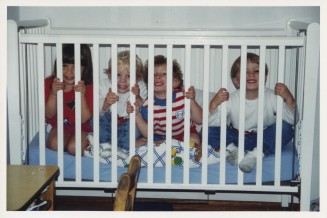Play Skills Are More Important Than You Think!

This article was originally posted in Your Middle Schooler: A Unique Age April 2008. I met with someone this week who runs corporate events, basically arranges for adults to “play” and was reminded of this article. I’ve always had strong feelings about play and development of play skills. I am seeing the trickle down effect with the older kids who don’t know how to “play”, get along with others, see others perspective or work in groups.
This morning I read an article in Smithsonian Magazine by Monica Watrous call “Playing for Keepsies”. It was a small article about a gentleman named Bruce Breslow and his Moon Marble Company in Bonner Springs, Kansas. The Moon Marble Company produces both expensive hand crafted marbles and inexpensive machine made marbles. Breslow is a woodworker who became interested in marbles after buying marbles for the wooden board games he made.
This article caught my eye because I loved playing marbles, trading marbles and looking at marbles when I was a kid. But, what was most interesting to me was Breslow’s quote at the end of the article. When asked about the future of marbles he stated, “I am not concerned for the future of marbles I am concerned for the future of play”. Breslow’s quote reminded me of something I have believed for years and that is that kids no longer have as many opportunities to “learn” how to play with others.
When I talk about play, I am referring to free play with other children, not adult organized or adult supervised. Now you might say that daycare or preschool is play but think about it, it is really play with adult rules. Only two kids might be able to play with the blocks, no more than five can be painting, please don’t take the play dough to the coloring station, clean up everything right away and if there is a disagreement there is an adult to step right in and solve the problem. These rules are not bad or outrageous and most are needed in a school type setting. But if a child does not learn to initiate interactions on their own, negotiate with other children or create their own fun, they clearly demonstrate a certain lack of social development and definitely a lack of creativity. I would also venture to say they also demonstrate a lack of work ethic. These kids do not learn how to put effort into playing, which is a kid’s job.
So what is the difference? Adults who grew up in the 60ies or 70ies were probably the last generation to really enjoy playing. We were home more, few kids were in daycare and kindergarten was half day. We had the run of the neighborhoods we went from backyard to backyard, played in the parks and the alleys. We had a different comfort level of safety. We were able to go to the park, the library, the bowling alley, shopping, the dairy queen and the movies alone and on our own. We did not have video games and for some of us television was still in its infancy. When it was nice out, our parents kicked us outdoors. When we wanted to play with someone, we went and stood outside their house and shouted their name is a sing song voice. When we did play dough or played Barbies there was no adult around to tell us what we should do. Our parents allowed us to be creative on our own. Now I know our parents must have had an eye or an ear on us most of the time but I never had a sense of them hovering. Board games were a staple (along with marbles, pick up sticks, checkers and cards) and actually required you to initiate and interact with others. We also made up a lot of our games or learned made up games from older kids.
In the 80ies and 90ies, the world changed. More couples were working which meant kids went to daycare and after school programs. Parents had to become more aware and concerned with their child’s safety. You could no longer always count on someone being home down the street. Kids started taking lessons after school and organized sports for younger children developed. Time for free play was becoming non-existent. A child’s circle of friends expanded beyond the neighborhood, which meant play dates had to be arranged and rides provided. Kids don’t know all the other kids on their block anymore. It seems that parents also began to compete for who is the best parent. Meaning the more I am involved, the more money I spend and the more accomplished my kids are, became a reflection of good parenting.
Today a kid’s idea of playing might be going over to someone’s house and watching them play a video game. It is so sad and pathetic to watch. Suggest a board game to them and they think you are lame. Make them go outside and that might last a half hour or so at best. Kids will also give a running account of what they are doing. Not just the big stuff like “we are going to the park” but little stuff like we are going to play wiffle ball, we are going to play a video game or we are getting a snack”. It is almost like they are looking for adult approval for their play choices. So now, I wonder what have we done to the kids to condition them like that? In the process, have we taken away their independence, their ability to make choices and their ability to interact with peers? Many adults think they can teach children how to play but they really can’t. Kids need to teach kids how to play.
If you think kids are getting an opportunity to play at school, think again. Recess and lunch recess is 15 minutes at best these days. Hardly enough time to organize and play anything. Once kids get to middle school, there may be no recess or lunch recess.
If you have younger children try and provide them with lots of opportunities to play with other kids. If play dates are a must, then remain scarce while they are together and let them make decisions and work things out. Leave a lot of toys and games accessible even if it means a mess. That will provide them with ideas and choices. Encourage kids to go outside and create their own games. If you live a safe area, encourage bike rides around the block or trips to the playground. This can instill a real sense of independence.
Older kids should be encouraged to get involved with after school activities. They may need help and guidance to find the right activities. Most communities offer a lot of choices and your school should be able to help you with this. Use common sense; find something they like to do not something you want them to do. It is also your responsibility to know where they are, what they are doing and who they are with. Hanging out outside a convenience score or playing video games 24/7 will not develop any marketable skills that I am aware of.
Social skills and the ability to get along with others is key to success in any relationship, be it a relationship with a boss or co-workers or more intimate relationships with friends, spouses or family. I believe the seeds to good social skills are planted early and developed through experiences and guidance. You may have the brightest child in the world but if they have not had good social exposure, developed good play skills or can’t negotiate with peers, life is going to be really hard and possibly lonely.
Play is important so encourage your child to do it often. However, it is more difficult for some kids to initiate this on their own. For those kids provide opportunities for them to play and socialize with peers. Just remember, instead of being part of the play group, let them figure out what to do, what to talk about, decisions and who will be the leader. If a disagreement occurs don’t step in right away, see if they can resolve it on their own. The same rules apply to your own children. Take a step back, watch and listen to the kids interacting. I know you will enjoy the show.







